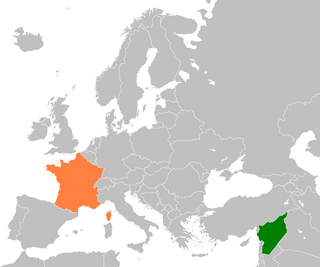
Bashar al-Assad is a Syrian politician who is the current and 19th president of Syria since 17 July 2000. In addition, he is the commander-in-chief of the Syrian Armed Forces and the secretary-general of the Central Command of the Arab Socialist Ba'ath Party, which nominally espouses a neo-Ba'athist ideology. His father and predecessor was General Hafiz al-Assad, whose presidency in 1971–2000 marked the transfiguration of Syria from a republican state into a de facto dynastic dictatorship tightly controlled by an Alawite-dominated elite composed of the armed forces and the Mukhabarat, who are loyal to the al-Assad family.

A civil war has been going on in Syria since 2011, following the events of the 2011 Syrian Revolution, which was part of the international wave of protest known as the Arab Spring. The government, headed by Bashar al-Assad, son of previous leader Hafez al-Assad, is based in Damascus, the traditional capital. The Ba'athist government conducts Presidential elections and parliamentary elections to the People's Council.

Basil al-Assad was a Syrian engineer, colonel, equestrian and politician who was the eldest son of Syrian President Hafiz al-Assad and the older brother of (later) President Bashar al-Assad. It was widely expected that he would succeed his father as President of Syria until he died in a car accident in 1994.

Mustafa Abdul Qadir Tlass was a Syrian senior military officer and politician who was Syria's minister of defense from 1972 to 2004. He was part of the four-member Regional Command during the Hafez Assad era.

Hasan Ali Turkmani was a prominent Syrian military commander and Arab Socialist Ba'ath Party member. He served as the Minister of Defense in Syria from 2004 to 2009.
Hafez Mohamad Makhlouf, also known as Hafez Makhlouf, is a retired Syrian colonel and former intelligence officer who was head of the Damascus branch of the Syrian General Intelligence Directorate. He was a member of Syrian president Bashar al-Assad's "inner circle" of close supporters.

The al-Assad family, also known as the Assad dynasty, is a Syrian political family that has ruled Syria since Hafiz al-Assad became president of Syria in 1971 under the Ba'ath Party. After his death, in June 2000, he was succeeded by his son Bashar al-Assad.
The following is a timeline of the Syrian Civil War from January to April 2012, during which time the spate of protests that began in January 2011 lasted into another calendar year. An Arab League monitoring mission ended in failure as Syrian troops and anti-government militants continued to do battle across the country and the Syrian government prevented foreign observers from touring active battlefields, including besieged opposition strongholds. A United Nations-backed ceasefire brokered by special envoy Kofi Annan met a similar fate, with unarmed UN peacekeepers' movements tightly controlled by the government and fighting.

A constitutional referendum was held in Syria on 26 February 2012. In response to the Syrian Civil War, President Bashar al-Assad ordered a new constitution to be drafted. The referendum was not monitored by foreign observers.
This article details the Syrian government's response to protests and civilian uprisings of the Syrian revolution which began in early 2011, that unravelled the socio-political stability of Syria, eventually plunging the country into a nationwide civil war by mid-2012.
Manaf Tlass or Manaf Tlas is a former Brigadier General of the Syrian Republican Guard and member of Bashar al-Assad's inner circle who defected in 2012. He was the first Syrian Republican Guard commander to defect from the Syrian military and declare support for the opposition.
Mohammad Al Atrash is a Syrian economist and independent politician who served as a cabinet minister in different periods.

Saudi Arabia–Syria relations refer to bilateral and economic relations between Saudi Arabia and the Syrian Arab Republic. Diplomatic ties between these two countries of the Middle East have long been strained by the major events in the region. Saudi Arabia has an embassy in Damascus, and Syria has an embassy in Riyadh. Both countries are members of the Arab League and share close cultural ties.

Presidential elections were held in Syria on 3 June 2014. There is a scholarly consensus that the elections were not democratic. The result was a landslide victory for Bashar al-Assad, who received over 90% of the valid votes. He was sworn in for a third seven-year term on 16 July in the presidential palace in Damascus.

The Conference for Change in Syria, or Antalya Opposition Conference, was a three-day conference of representatives of the Syrian opposition held from 31 May until 3 June 2011 in Antalya, Turkey. Since the early days of the Syrian civil uprising, it was the second of its kind, following the Istanbul Meeting for Syria that had taken place on 26 April 2011.
Naila Al Atrash, a Syrian director, film, television and theater actress, is a director in Arab theater.

Oman–Syria relations refer to the relationship between the Sultanate of Oman and the Syrian Arab Republic. Oman has an embassy in Damascus; while Syria has an embassy in Muscat. Both are members of the Arab League, and despite the ongoing civil war occurring in Syria, Oman has not closed its embassy in Syria and both countries maintain diplomatic relations, in sharp contrast to other Arab states of the Persian Gulf who have cut off diplomatic ties with Syria and closed their embassies.

France–Syria relations refers to the bilateral relations between France and the Syrian Arab Republic. Relations between France and Syria have a long and complex history. The contemporary relationship largely dates back to the French mandate (1923–1946) over the region established in the midst of the defeat and subsequent Partition of the Ottoman Empire at the end of World War I.

Abkhazia–Syria relations refers to the bilateral relationship between the Republic of Abkhazia and Syria. Syria recognised Abkhazia on 29 May 2018. The establishment of relations on an embassy-level was announced very early. Syria has an embassy in Sukhumi. Abkhazia has an embassy in Damascus.

Sana Mustafa is a Canada-based Syrian refugee, author, activist and non-profit founder.













